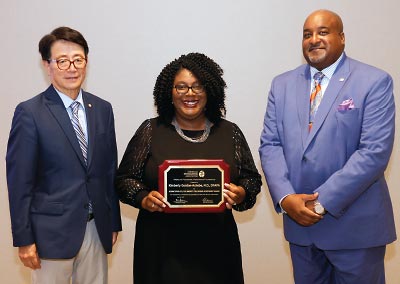Gordon-Achebe Wins Spurlock Minority Fellowship Program Award
Abstract
The annual award honors the achievements of former fellows of the Minority Fellowships who have made significant contributions to psychiatry and the minority community.
Kimberly Gordon-Achebe, M.D., was honored with the Jeanne Spurlock, M.D., Minority Fellowship Program Achievement Award at the APA’s Annual Meeting in New Orleans.

Kimberly Gordon-Achebe, M.D., stands with Edmond Pi, M.D. (left), and Rawle Andrews Jr., Esq., after receiving the Jeanne Spurlock, M.D., Minority Fellowship Program Achievement Award at APA’s 2022 Annual Meeting. Pi is a member of the APA Foundation’s Board of Directors, and Andrews is the APA Foundation’s executive director.
Gordon-Achebe, a past president of APA’s Caucus of Black Psychiatrists, is an assistant professor of psychiatry at the University of Maryland School of Medicine and program director of the Child and Adolescent Fellowship Program. She also directs the child services portion of the Programs of Assertive Community Treatment, a mobile unit that brings mental health treatment to individuals who are unable to use traditional outpatient clinic services due to the seriousness and complexity of their problems.
“I am very humbled to have received the Jeanne Spurlock award,” Gordon-Achebe told Psychiatric News. “It is an incredible honor to receive, especially considering the awardees prior to myself. It feels amazing to be among this distinguished group.”
The annual award recognizes the achievements of a distinguished alumnus of APA’s Minority Fellowship Program who has demonstrated a commitment to advancing equity in health care for minority and underserved populations as well as advancing the profession of psychiatry.
Spurlock (1921-1999) was a pioneer in the field of child psychiatry, a leader, an educator, and a writer who drew inspiration in her career from the challenges she faced in life as an African American woman. Spurlock centered her work on the mental health needs of underserved groups, particularly children and women in the Black community. She also worked to focus the medical community’s attention on the stresses of poverty, sexism, racism, and discrimination that affect minority members, women, and the gay and lesbian community.
Spurlock worked as an APA deputy medical director for 17 years, where she founded the Minority Fellowship Program and served as director of APA’s Office of Minority and National Affairs, now the Division of Diversity and Health Equity. She often lobbied policymakers to ensure funding for medical and post-medical education, particularly for minorities.
Gordon-Achebe is a child and adolescent community psychiatrist practicing in Baltimore. The preventative nature of child and adolescent psychiatry was what attracted her to this specialty, she said. “You can reach people early and really change the trajectory of their lives.”
Gordon-Achebe said she considers herself both an equity psychiatrist and an anti-racist psychiatrist, which to her means thinking about psychiatry very differently from the way she was trained. The award is especially meaningful to her, she added, given her decision to focus her career on child and adolescent psychiatry—as Spurlock did—as well as on minoritized populations. “Children and adolescents with mental illness are an underserved population.”
Gordon-Achebe pointed out that young people today are part of the most diverse group of youth in U.S. history.
“In 2019, we had more children identify as Black, Indigenous, and People of Color [BIPOC] than at any other time in U.S. history.” In 1980, the majority of U.S. children under age 15 were White (74%), but as of 2019, the trend has shifted, with Whites making up less than half of this demographic (49.9%) and the other racial groups–Blacks, Hispanics, Asians, and multiracial individuals–comprising the dominant share of youth (50.1%). In fact, Hispanics account for more than a quarter of this country’s youth.
“This cultural demographic shift warrants pause to consider how systems must change to meet the population’s needs,” Gordon-Achebe said. “In fact, the experience of racism in BIPOC communities is the leading contributor to the mental health crisis in this population. Instructing future doctors, especially child and adolescent psychiatrists, to address societal barriers with structural competency and teaching them how to practice with cultural humility has been my life’s work.”
As founder and principal consultant of Bringing Health Equity Training to Communities (BHETC), Gordon-Achebe provides training on health disparities, the social determinants of health, and microaggressions and prejudice in medicine. She also works to educate communities about mental health and trauma at various church, community, and school venues. ■
Resources
More information about APA’s SAMHSA Minority Fellowship
Information about the Jeanne Spurlock Congressional Fellowship



